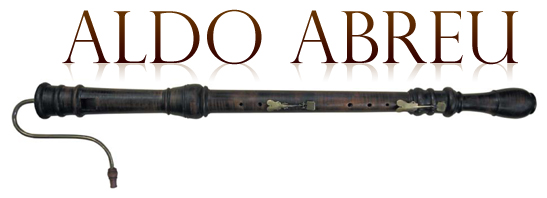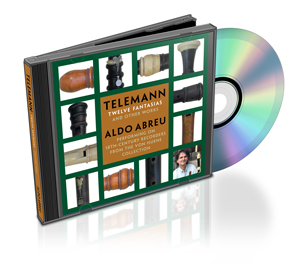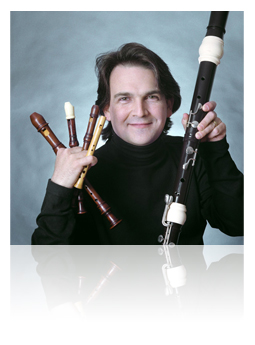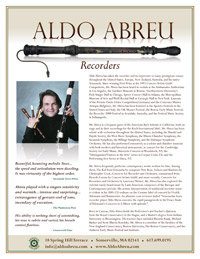

 Biography Biography
Aldo Abreu has taken the recorder and its repertoire to many prestigious venues throughout the United States, Europe, New Zealand, Australia, and his native Venezuela. Since winning First Prize at the 1992 Concert Artists Guild Competition, Mr. Abreu has been heard in recitals at the Ambassador Auditorium in Los Angeles, the Gardner Museum in Boston, Northwestern University's Pick-Staiger Hall in Chicago, Spivey Concert Hall in Atlanta, the Metropolitan Museum of Arts and Weill Recital Hall at Carnegie Hall in New York. Laureate of the Premio Flauto Dolce Competition(Germany) and the Concours Musica Antiqua (Belgium), Mr. Abreu has been featured at the Spoleto Festivals in the United States and Italy, the OK Mozart Festival, the Boston Early Music Festival, the Recorder 2000 Festival in Armidale, Australia, and the Festival Music Society in Indianapolis. Mr. Abreu is a frequent guest of the American Bach Soloists in California, both on stage and in their recordings for the Koch International label. Mr. Abreu has been soloist with orchestras throughout the United States, including the Handel and Haydn Society, the West Shore Symphony, the Illinois Chamber Symphony, the Savannah Symphony, the Billings Symphony, and the Dubuque Symphony Orchestra. He has also performed extensively as a soloist and chamber musician with both modern and historical instruments, in concert for the Cambridge Society for Early Music, Maverick Concerts in Woodstock, NY, the "Distinguished Visitors in the Arts" series in Corpus Cristi, TX, and the Performing Arts Series in Utica, NY. Mr. Abreu frequently performs contemporary works written for him. Among them, The Kid from Venezuela by composer Pete Rose, Echoes and Shadows by Christopher Cook, Concerto for Recorder and Orchestra, comissioned from Ricardo Lorenz by Concert Artists Guild, and most recently, Concerto for Recorders and Orchestra by Lawrence Weiner. Mr. Abreu has also explored the rich but rarely heard music by Latin American composers of the Baroque and Contemporary periods. His artistic interpretation of traditional recorder music is evident in his 2005 CD realease on the Centaur label of concerti by Vivaldi, Telemann and Boismortier. An allmusic.com reviewer hailed "Venezuelan-born recorder player Aldo Abreu executes the rapid passagework in the Vivace finale of Telemann's Concerto in A Minor with aplomb." Born in Caracas, Aldo Abreu holds the Performer's and Teacher's diplomas from the Royal Conservatory in the Hague, and a Master's degree from Indiana University in Bloomington. His teachers have included Ricardo Kanji, Michael Barker and Scott Martin Kosofsky. Mr. Abreu is a member of the faculties of the New England Conservatory, Boston University, The Boston Conservatory, and the Amherst Early Music Festival and Institute. |
| Copyright @ 2010 Aldo Abreu. All rights reserved. |
|
Contact: info@AldoAbreu.com
|
|
Flyer Download
JPG (1.5 MB) |
| Reviews of the of Vivaldi Concerto RV 445 with Boston Baroque on 1/1/12
"The Concerto itself is a nice enough piece, even if it sounds like any number of other Vivaldi concertos. Though the work’s musical material didn’t stick in my mind long after the concert, Mr. Abreu’s performance of the virtuosic solo part certainly did: his playing was nothing short of spectacular. In the first movement, the most involved of the three, he dispatched rapidly tongued arpeggiated figures with breathtaking agility and energy. The succinct, second movement allowed for a beautifully shaped, lyrical, sopranino recorder melody. The brisk finale brought back the character of the opening movement minus some of its acrobatics." "After an intermission which supplied Champagne to toast the new year, the second half consisted of two pieces of Antonio Vivaldi which decidedly don’t fit the widespread conception of the composer as almost entirely a string composer. Our radio host, Cathy Fuller, had an illuminating preliminary conversation with Martin Pearlman about Vivaldi’s position as music teacher at a Venetian girls’ orphanage, the Ospedale della Pietà, in which he developed formidable musical skills in a number of the orphans. These soloists, being young girls, had to perform behind screens, as it was thought improper for audiences to see them. The first piece, Concerto in A Minor for Sopranino Recorder (RV 445), was composed for one of these talented students. The soloist here was Aldo Abreu (who had previously lent a lovely recorder color to the orchestra accompanying Barbara Poeschl-Edrich in the Handel concerto). The sopranino recorder — like the piccolo — sounds an octave higher than its soprano counterpart. It is certainly a challenge to compose “serious” music for such a high-pitched instrument (one thinks immediately of the chuckle produced by Papageno’s pipes), but Vivaldi has left us a very fine work brought to life wonderfully by Abreu. On this diminutive instrument, I’m tempted to describe Abreu’s work as “prestidigitation,” but there was no legerdemain possible here: as with the triple harp, the fingerwork had to be, and was, extremely precise. There seemed to be no type of virtuosity neglected by Vivaldi, including a stupendous passage that seemed to demand circular breathing, though Abreu stated it was done all on one immense breath. The slow movement, by contrast, allowed the expressive gifts of the player to be heard, including vibrato and dynamic nuance. I was most grateful for a rare opportunity to hear this unusual work, particularly in such a brilliant performance." "After the intermission we were entertained by two spectacularly virtuosic works by Vivaldi. Aldo Abreu was the soloist in the Concerto in A Minor for sopranino recorder and orchestra, one of the many works composed for the talented girls of the famous Ospedale di Pietà orphanage in Venice, where Vivaldi taught for many years. Abreu showed himself to be a master of this tiny instrument, which sounds an octave higher than written — more or less in the range of a modern piccolo. His adroit phrasing and skillful ornamentation were nothing short of amazing in fast passage work, while superb breath control allowed him to sustain extended melodic arabesques in the aria-like Larghetto. The Finale, working up to a climactic crescendo at breathtaking speed, brought down the house." |

